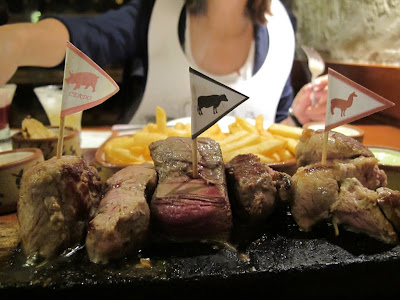 |
| Peru produces 15 different types of Corn |
It will come as no surprise for people who know me
that at some point I post en entry on food! And how perfect for Peruvian
cuisine to serve as the backdrop for that. After all, this is the region of the
world (from Mexico to Southern Peru) that gave us peanuts, tomatoes, potatoes
(and its sweet cousin), beans, corn,
quinoa (which the NASA incorporated in the
astronauts’ diet in the 1980's), papaya (paw-paw),
grenadine and cocoa.
 |
| All kinds of fruits on offer in some of the best supermarket we've seen anywhere |
 |
| Very nice presentation for a simple salad |
Peruvian cuisine is on its way up. This is a country
that prides itself to have more than 3.000 varieties of potatoes (music to the
ears of our Belgian and Mauritian friends) . For long Peru has favoured Spanish
dishes which the higher class considered more befitting people of their standing while dismissing
Andean traditional cuisine.
 |
| Open Kitchen at "A Mi Manera" |
 |
| The Peruvian Ceviche is a must |
But fortunately things change. With the immigration of
many Chinese, Japanese and Italians and local African and Andean influences
Peruvian cuisine has forged itself a unique identity. By merging all the
aforementioned and adapting to local ingredients Peruvian top chefs are
among the most innovative on the planet. Lima was the theatre of the South
American Gastronomy event of the year back in September during which it’s most
flamboyant chef Gastón Acurio entertained a panel of international colleagues
to his vision of Peruvian Gastronomy.
 |
| 3 meats sizzling on hot volcanic rock |
 |
Avocado Salad with Parmesan Chips
|
 |
| Waiting for chicken liver on a skewer |
Because Peru also has every type of climate from the
windy coastline to the humid jungles and dry deserts virtually all kinds of
fruits, vegetable and meat may be found here. The Peruvians enjoy food in every
way, shape or form at almost anytime of the day or night whether it is from a street
vendor or a hip restaurant. I get hungry all the time here. There'e food everywhere and it all looks good. How can one resist a chicken grilled to a golden crisp and some chunky chips.
 |
| Cooking class in Cusco - Rocoto Rellena |
 |
| Cuy al Horno - less meat than I thought on it |
It is worth mentioning as well here the Cuy, i.e. the Guinea Pig.
This is specialty is usually prepared whole, body ridden of the internal organs
and stuffed with aromatic herbs. The best way to prepare it is in the oven,
although in some restaurants it may be deep fried.
 |
| A replica cocoa tree inside the museum |
Another gift to the world for which hundreds of millions will be grateful is Cocoa. The
Mayas in Southern Mexico discovered this plant that grew in the wet tropical forests.
The tree can reach 3-5 metres high and
produces huge pods up to 30cm long in which there are 20-30 Cocoa seeds. The
best output occurs between 5 and 15 years. The Mayas used to mix cocoa with
chili before drinking.
 |
| Roasting the seeds |
 |
| Preparing the chocolate for the final cooling stage |
Then the Spanish discovered the bean, but preferred it
sweet. So they added milk, honey, cinnamon,
sugar, cloves in all combinations and proportions. That’s about the time the
term “Chocolate” emerged. For more than one century Spain kept this precious secret from the other European courts. When the others did find out about it Spain still
had a monopoly on imports for another century. Cocoa beans were as precious as gold. The
other European colonial powers wanted their own production and that’s how the plant was
introduced to Ivory Coast (FR), Ghana (GB), Indonesia (NL).
Our pictures of the Chocolate Museum
 |
| Trio of Pisco Sour |
 |
Fill it to rim Kev!
|
Pisco Sour : This is the national drink in Peru. It is
a colourless grape brandy. The closest thing to Pisco is Spanish Orujo or
Italian Grapa. To prepare a Pisco Sour one needs : 2 fl oz of Pisco, 1 fl oz of
fresh Lime juice, 3/4 fl oz Cane syrup, 1
Egg white, 1 dash of Bitters and ice
cubes. Crush the ice and shake all the above except for the bitters for 30
seconds. Pour the drink and ad a few drops of bitters on the white foam. It is
sweet, cold, refreshing … and extremely treacherous :-).
 |
Max posing proudly in front of his masterly executed Fettuccine Alfredo with clams, salted butter and sweet Balsamico di Modena
|
No comments:
Post a Comment